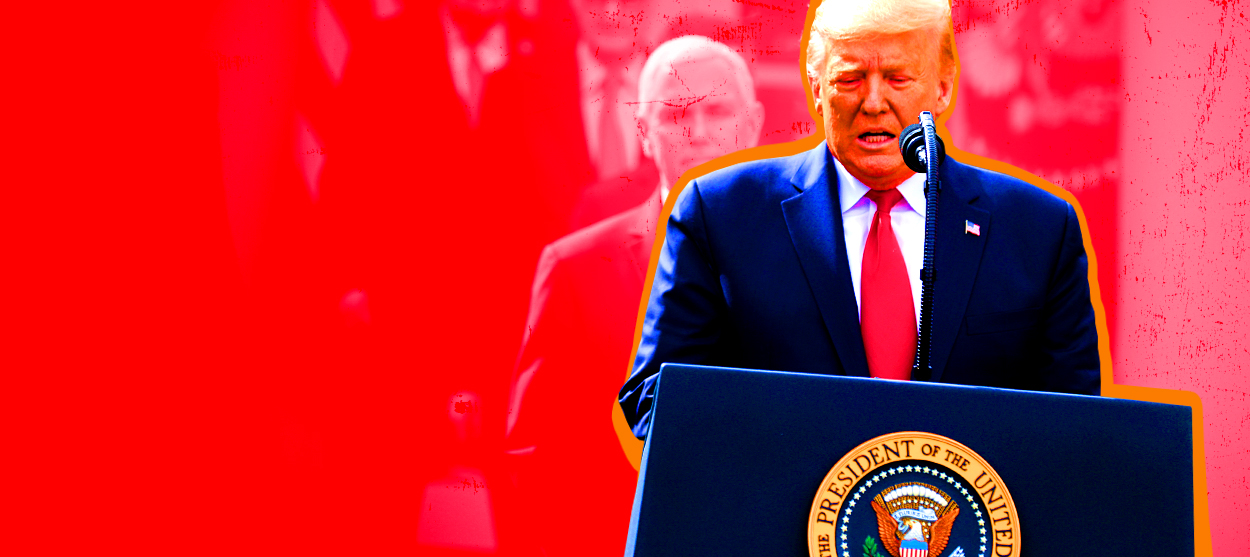Trump just gave the worst speech of his presidency
The president's national emergency declaration will reassure no one


A free daily email with the biggest news stories of the day – and the best features from TheWeek.com
You are now subscribed
Your newsletter sign-up was successful
On Friday afternoon, Donald Trump gave the worst speech of his political career.
He appeared at the podium in the Rose Garden half an hour late. He looked and sounded exhausted. He stumbled over the word "coronavirus" in his very first sentence and seemed to struggle at a number of points throughout his address. His wonted improvisations and other departures from the script did not suggest his usual ease. He sounded very much like what one suspects he is: a tired and confused senior citizen.
The problems with Trump's speech were not limited to the manner in which it was delivered. Among other things, he ought to have secured a deal with Nancy Pelosi and House Democrats before speaking. His emphasis on the extraordinary achievements of such noted public servants as the CEO of Walmart (whose stock price is surging as I write this) did not exactly inspire confidence that the most important thing in this ordeal is public health and safety, as opposed to corporate profits. The bizarre round-table approach that brought everyone from public health officials to business leaders to the vice president (who said some genuinely touching things about the elderly) before the podium was confusing. It was nice of the president to remind us that "so many of the great sports we've gotten used to" have been put on hold. I was surprised that he did not once mention the 41 Americans who have already died of the virus until well into the question-and-answer portion of the proceedings, when he misstated the number.
The Week
Escape your echo chamber. Get the facts behind the news, plus analysis from multiple perspectives.

Sign up for The Week's Free Newsletters
From our morning news briefing to a weekly Good News Newsletter, get the best of The Week delivered directly to your inbox.
From our morning news briefing to a weekly Good News Newsletter, get the best of The Week delivered directly to your inbox.
It is too early to say whether the various new measures Trump announced will be effective. (Some of the obviously sensible ones — waiving interest on federal student loan debt, for example — are likely to be lost in the confusion.) I, for one, think it is still likely that much of the media response to the virus has been hysterical, and that in two months schoolchildren across the country will longingly remember the time they got three extra weeks of spring break. But that is not relevant to my assessment of Trump's performance on Friday. On arguably the biggest stage of his presidency, he not only failed to give the impression that he was in control of the situation, he looked about as ready to handle a crisis as Joe Biden is to speak calmly to elderly voters in Iowa or quote the Declaration of Independence.
Agreeing to take questions following his prepared remarks was almost certainly a mistake. In the coming days and weeks and months, Trump will have virtually unlimited opportunities to attack the legacy of the Obama administration. This was not the occasion for it. In so many other contexts, Trump's disdain for the press is defensible and even amusing. Friday it made him seem petty. And it is never a good idea for a president in the face of a crisis to tell the country that he takes "no responsibility" for anything (in this case, delays in virus testing). Taking responsibility is what the office is all about.
These impressions will not go away. They will certainly outlast the pandemic. No American will remember the day that President Trump addressed the nation on the subject of the coronavirus pandemic the way they remember Ronald Reagan's response to the Challenger disaster. If we have any lasting impressions they will be of an enervated, verbally infelicitous elderly man attempting to speak to realities that he is only half aware of ("unlike websites of the past"). The best thing he can hope for is that many of us will feel that Trump perfectly captured the national mood of alternating feverish speculation and exhaustion.
Want more essential commentary and analysis like this delivered straight to your inbox? Sign up for The Week's "Today's best articles" newsletter here.
A free daily email with the biggest news stories of the day – and the best features from TheWeek.com
Matthew Walther is a national correspondent at The Week. His work has also appeared in First Things, The Spectator of London, The Catholic Herald, National Review, and other publications. He is currently writing a biography of the Rev. Montague Summers. He is also a Robert Novak Journalism Fellow.
